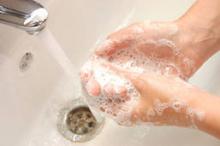A two-year-old boy was found by police wandering alone in the streets of Bell, Calif., last week. Neighbors reported that before he was apprehended, the boy approached a series of barnyard animals and asked, “Are you my mother?” In fact, the toddler apparently was just running down to the convenience store to pick up a new binkie and a six-pack of juice boxes when he panicked, realizing he still didn’t know how to unsnap his onesie. As officers returned the child to his parents’ outstretched arms he could be heard to say, “YOU are my mother! Now about that cell phone ...”
That’s Colic
You know how some things are a lot more stressful for parents than they are for kids, like the first day of school, driver’s education, and childbirth? According to a new study in Pediatrics it appears we can add colic to that list. Incredibly patient Australian researchers followed a cohort of over 7,000 infants for 21 years, all while waiting for “Crocodile” Dundee to make a comeback. They noted which infants had colic, or as they say in Australia, “infant behavioral dysregulation,” which, trust me, sounds a lot sexier with the accent. They then surveyed the mothers, asking whether those children had behavioral problems at age 5, 14, and 21. At the same time, the researchers assessed the children themselves for the presence of behavioral problems, such as drinking too much Foster’s Lager or tormenting wallabies.
Mothers of colicky infants reported that their children had a higher-than-average rate of behavioral problems at every age, but by the time the kids could answer questions for themselves at ages 14 and 21 it turned out they were at no more risk of behavioral and emotional problems than kids who had not been colicky. There is good news here for pediatricians to share with mothers of fussy infants: in 21 years not only will their kids have grown into mentally stable young adults, there’s a chance some Hollywood visionary will finally greenlight “Crocodile” Dundee IV.
Risky Business Downturn
Despite all signs to the contrary, it’s becoming clear that today’s teens are measurably less stupid than were those in past decades. Not only are teen birth rates at historic lows, but now the Centers for Disease Control and Prevention (CDC) tell us that half as many teens are drinking and driving, compared to only 2 decades ago! How long can it be before we have a generation of kids telling their elders to pull up their pants, comb their hair, and turn down that noise that they call music?
CDC researchers evaluated the annual Youth Behavioral Risk Surveys to determine that only 10.3% of US teens report drinking and driving in 2011, compared to 22.3% in 1991. Data do not exist to analyze what role was played by the cancellation of Cheers. Teens who did drink and drive were also more likely to binge drink than were their peers, a finding that led one researcher to comment, “Well, duh!” If current trends continue this generation of teens can be expected to reverse global warming, cure cancer, and finally put an end to Casual Fridays.
Wipeout
An industry-sponsored study has demonstrated that giving free hygiene supplies to children in school classrooms increases the use of hygiene supplies by children in school classrooms. The report, destined to serve as a landmark in the field of giving-away-sanitizer-and-wipes, demonstrated reductions as great as 76% in the presence of germs on such surfaces as school desks, cafeteria tables, and bathroom stall handles. In addition to being given samples of hand sanitizer, antibacterial wipes, and antiviral facial tissues, children were instructed in proper hand-washing technique, how to cough into their elbows, and the importance of never licking bathroom stall handles, even if double-dog-dared. Ongoing studies will examine whether giving toddlers free binkies and juice boxes will keep them from wandering in the streets.
David L. Hill, M.D, FAAP, is vice president of Cape Fear Pediatrics in Wilmington, NC and is an adjunct assistant professor of pediatrics at the University of North Carolina at Chapel Hill. He is Program Director for the AAP Council on Communications and Media and an executive committee member of the North Carolina Pediatric Society. He has recorded commentaries for NPR's All Things Considered and provided content for various print, television and Internet outlets. Dr. Hill is the author of Dad to Dad: Parenting Like A Pro (AAP Publishing 2012).


